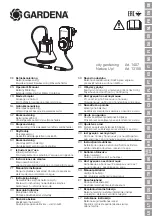
3-2
11645A
Use, Maintenance, and Care of the Devices
Electrostatic Discharge
Electrostatic Discharge
Protection against ESD (electrostatic discharge) is essential while connecting, inspecting,
or cleaning connectors attached to a static-sensitive circuit (such as those found in test
sets).
Static electricity can build up on your body and can easily damage sensitive internal
circuit elements when discharged. Static discharges too small to be felt can cause
permanent damage. Devices such as calibration components and devices under test
(DUTs), can also carry an electrostatic charge. To prevent damage to the test set,
components, and devices:
• always wear a grounded wrist strap having a 1 M
Ω
resistor in series with it when
handling components and devices or when making connections to the test set.
• always use a grounded, conductive table mat while making connections.
• always wear a heel strap when working in an area with a conductive floor. If you are
uncertain about the conductivity of your floor, wear a heel strap.
• always ground yourself before you clean, inspect, or make a connection to a
static-sensitive device or test port. You can, for example, grasp the grounded outer shell
of the test port or cable connector briefly.
• always ground the center conductor of a test cable before making a connection to the
analyzer test port or other static-sensitive device. This can be done as follows:
1. Connect a short (from your calibration kit) to one end of the cable to short the center
conductor to the outer conductor.
2. While wearing a grounded wrist strap, grasp the outer shell of the cable connector.
3. Connect the other end of the cable to the test port.
4. Remove the short from the cable.
Refer to
for part numbers and instructions for ordering ESD protection devices.
Figure 3-1 ESD Protection Setup
Summary of Contents for 11645A Series
Page 4: ...iv ...
Page 6: ...vi 11645A Contents ...
Page 7: ...11645A 1 1 1 General Information ...
Page 11: ...11645A 2 1 2 Specifications ...
Page 14: ...2 4 11645A Specifications Electrical Specifications ...
Page 15: ...11645A 3 1 3 Use Maintenance and Care of the Devices ...
Page 22: ...3 8 11645A Use Maintenance and Care of the Devices Handling and Storage ...
Page 23: ...11645A 4 1 4 Performance Verification ...
Page 26: ...4 4 11645A Performance Verification Recertification ...
Page 27: ...11645A 5 1 5 Troubleshooting ...
Page 29: ...11645A 5 3 Troubleshooting Troubleshooting Process Figure 5 1 Troubleshooting Flowchart ...
Page 32: ...5 6 11645A Troubleshooting Contacting Agilent ...
Page 33: ...11645A 6 1 6 Replaceable Parts ...
Page 35: ...11645A 6 3 Replaceable Parts Introduction Figure 6 1 R Band Component Identification Sheet ...
Page 37: ...11645A 6 5 Replaceable Parts Introduction Figure 6 2 Q Band Component Identification Sheet ...
Page 39: ...11645A 6 7 Replaceable Parts Introduction Figure 6 3 U Band Component Identification Sheet ...
Page 41: ...11645A 6 9 Replaceable Parts Introduction Figure 6 4 V Band Component Identification Sheet ...
Page 43: ...11645A 6 11 Replaceable Parts Introduction Figure 6 5 W Band Component Identification Sheet ...
















































